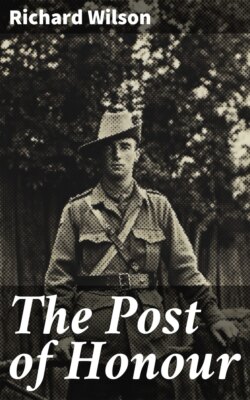Читать книгу The Post of Honour - Richard Wilson - Страница 6
На сайте Литреса книга снята с продажи.
CAPTAIN GRENFELL AND THE CHARGE OF THE LANCERS
ОглавлениеTable of Contents
It was at Mons in Belgium that the British soldiers first met the Germans. They were outnumbered by three to one; and they were therefore forced to fall back till fresh troops could be brought up to their assistance.
But they put up a glorious fight as they fell slowly back to a better position for making an advance; and the story of Mons and afterwards is so full of accounts of brave deeds that it is not easy to choose from among them.
The name of Captain Grenfell, however, stands out boldly on the roll of honour; and the story of his winning of the Victoria Cross is one of the finest in the history of the British Army.
At half-past ten one morning, the Second British Cavalry Brigade received a welcome order. They were to “charge for the guns” as the Light Brigade had been ordered to do at Balaklava in the Crimean War. The order was received with the greatest glee, for the troopers had waited for three days listening to the roar of the guns but taking no part in the great fight.
The men were the 9th Lancers, 18th Hussars, and 4th Dragoons. On they rode, singing, shouting, cheering; but they had not ridden far before some of the riders dropped from their saddles while their horses galloped away. The rest set their teeth, gripped their lances more tightly and urged on their horses until the thunder of the iron-shod hoofs seemed to drown that of the German guns.
All at once, a merciless fire broke out from a number of machine-guns which had been cleverly hidden on their flank, about 150 yards away. The withering fire swept their close-set ranks and men and horses fell in scores; but there was no faltering among the rest. Onward they rode, careless of the ceaseless hail of bullets and of the shells which now burst round them from the heavy guns ahead.
At last they reached the German battery, and what happened there is thus described by a German soldier:—
“We were outside Mons in open country,” he said, “with a clump of hills before us, when a troop of howling, yelling men with lances came racing round a hill and then straight for us. Your artillery and your infantry, yes, they are like ourselves and we can fight them, but these lancers;—ach!
“We were four to one of them, but in a flash they were on us and through us! And there were not more than fifty of them. Every one of them speared a man—I got this in the shoulder—and some of our horses went over. Before we could re-form or get ready, they came dashing back, yelling like furies, and they went through us again. This time they stayed with us longer. … I will never meet them again, please you!”
The stern work was over, but the British cavalry had paid a heavy price to silence the German guns. The men who were left now looked about for cover, and soon found it behind a railway embankment; but they also found in this place a company of men of the Royal Field Artillery whose guns had been knocked out of action.
Captain Grenfell was among the surviving officers of the 9th Lancers, but he had been wounded in the thigh as well as in one hand. Weary and hurt as he was, the news that British guns were in danger of capture roused him to further efforts. Without a moment’s delay, he rode off into the fire zone to make observations.
Having satisfied himself that the guns could be drawn off he came back—at a slow pace, in order to give courage to his men. Then he asked for volunteers for the job, and got them too, for British soldiers always answer to the call to “save the guns.” “It’s all right,” he said simply, “they can’t hit us. Come along!”
The men loosed their horses and followed the captain on foot. In a few minutes they set off at the double heedless of the flying bullets and bursting shells, and came at last to the first guns which they quickly hauled out of danger. They went back again and again until all the precious guns were safe.
It was for his bravery on this day that Captain Grenfell was awarded the Victoria Cross—one of the first to be awarded in the Great War. At a later period of the war he was killed in action.
